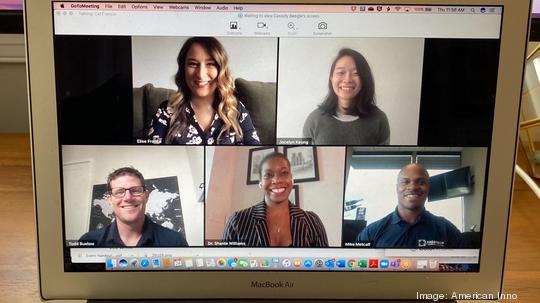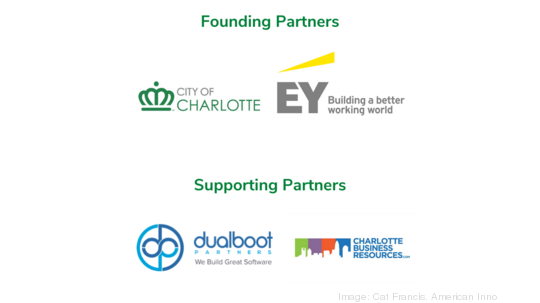
Calls for increased diversity and inclusion in tech and startup communities have been loud over the last few months. But for minority entrepreneurs, especially Black and women founders, the conversation never stops, and the impacts are lasting.
How can organizations create sustainable change that becomes less reactive and ingrained in the culture? What role do those outside of startup founders -- VCs, bankers, consultants -- play? And how should minority founders respond when they're trapped into speaking only about diversity?
These are a few of the topics we touched on during Charlotte Inno's virtual State of Innovation: Diversity, Equity and Inclusion. The panel featured Jocelyn Keung, founder of Fleurix and software engineer at Passport; Mike Metcalf, co-founder of DECK Leadership; and Dr. Shante Williams, author and CEO of Black Pearl Global Investments.
Below are a few key takeaways from Thursday's conversation.
[On Wednesday,] the Wells Fargo CEO issued an apology for his comments that there’s a lack of diversity at his bank because there’s a limited pool of Black talent. This is an excuse many startup and tech companies have used to justify their actions. How can we eliminate that excuse and mentality?
Williams: I think, first and foremost, we have to be so much more intentional, and we have to let go of this bias that the reason why women aren't in certain places, the reason why minorities aren't in certain places, is because they don't exist. You don't find things you aren't looking for. I always get the immediate pushback of, "Well, the best man or woman for the job is who will rise to the top." That's just not the case. If you don't have a ladder to get to the top, then it doesn't matter. That's why he felt so self-assured in saying that, but it's coming from the premise that [minority candidates] didn't exist int he first place.
Metcalf: To get to new ideas, you have to ask new questions, right? Old thinking won't lead to new ideas, and so when I see stuff like that, my instant thought patterns is "Why is that the case? Why is there a limited pool of Black people? if that actually true?"... There's an awareness piece there; there's an educational piece there; there's a proximity piece there; and all these things play into the fact that it rolls into recruitment. And we can do recruitment much better... There's so much data and metrics right now that we have access to anybody, anywhere. If we wanted them there, we can make it happen.
What type of questions should leaders in the startup world be asking themselves, and how can those questions become action items?
Metcalf: [Working in NASCAR,] Part of how we function and operate is due to other people wanting to use us as a marketing platform. You're having a lot of people now say, " Show us your board of directors; show us your executive team; show us your leadership group," and if that group is not reflective of the clientele, they're out. It's an easy equation, and so I think the question is, who are we serving? Who are the clients? Who are the end users? Are they reflective of where the world is?... What are we going to do to raise the bar so that when other people see how we do business, they're inspired and want to follow that lead?
Keung: Look at your data metrics and your recruitment and retention pipelines. Of all the applicants you're getting, how diverse is that pool, and of the people who are getting interviews, what does that look like? Are you already starting to see some trends there? And then once they're in the company, look at who's getting the promotions, look at pay equity... Things like that. I think data doesn't lie.
Minority founders know that lack of diversity and inclusion is an issue, and the issue is compounded when those founders speak up and find themselves boxed into speaking only about diversity, or worse, blacklisted by certain organizations. What's the resolution to that?
Williams: I now turn down more speaking requests than I do, because... that's not a box I want to exist in. So I always tell anyone in this space, be your own best advocate. Advocate for your community, and advocate for everybody else around you. When you start seeing that trend, and you're the only one they want to talk to, and it's only about the problems, you can do one of two things. One, say no. Or, get into the interview, and tell the story you want to tell. I tell people to be OK with being blacklisted... It shouldn't squash your voice. It should really mean, "OK, I must have said something so profound that it's under their skin, and they don't know what to do with it."
Keung: It's great to have [diversity and inclusion] topics covered, and they absolutely should be. But make sure the tech talks, the more substantial talks, are well represented. I'm proud to say that Fleurix is very representative on that front, and that's because it was a priority from day one for me. The other thing is, if the platforms are restricting you to a certain narrative, one thing we can do to help each other out is... shout out people you see who are doing great things. Create more platforms for people of color and minorities to thrive.
Huge thanks, again, to all of our amazing panelists, to everyone who tuned in and to our founding and supporting sponsors Dualboot Partners, EY and City of Charlotte.
Unable to join us or just want to see it again? Watch the full conversation below.
Thank you to our partners for powering Charlotte Inno




